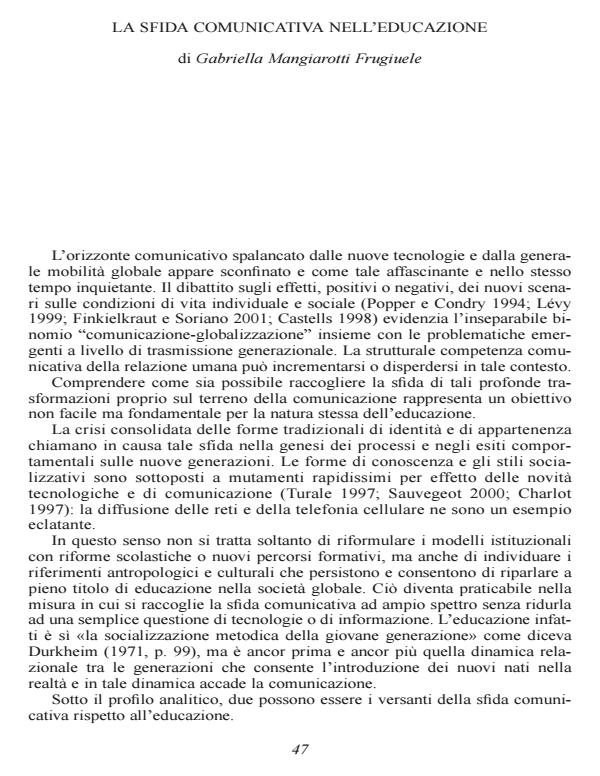La sfida comunicativa nell'educazione
Titolo Rivista SOCIOLOGIA DELLA COMUNICAZIONE
Autori/Curatori Gabriella Mangiarotti Frugiuele
Anno di pubblicazione 2005 Fascicolo 2005/37
Lingua Italiano Numero pagine 9 P. Dimensione file 37 KB
DOI
Il DOI è il codice a barre della proprietà intellettuale: per saperne di più
clicca qui
Qui sotto puoi vedere in anteprima la prima pagina di questo articolo.
Se questo articolo ti interessa, lo puoi acquistare (e scaricare in formato pdf) seguendo le facili indicazioni per acquistare il download credit. Acquista Download Credits per scaricare questo Articolo in formato PDF

FrancoAngeli è membro della Publishers International Linking Association, Inc (PILA), associazione indipendente e non profit per facilitare (attraverso i servizi tecnologici implementati da CrossRef.org) l’accesso degli studiosi ai contenuti digitali nelle pubblicazioni professionali e scientifiche.
New technologies and the general global mobility have opened an endless range in communication. This range seems to be attractive and disquieting at the same time. The debate on the effects, positive or negative, of the new scenarios on the individual and social life conditions (Popper 1994, Levy 1999, Finkielkraut 2001, Castells 1998) puts in evidence the inseparable couple communication globalization with the emergent problems that have to do with the generational transmission. The structural communicative competence of the human relationship can increase or disperse in such a contest. Understanding how the challenge of such deep transformations just on the ground of communication can be accepted is an uneasy but basic aim for the nature itself of education. The strong crisis of the traditional forms of identity and belonging involves this challenge in the origin of processes and in the behavioural effects on the new generations. The forms of knowledge and the socializative styles are subjected to very fast changes because of the innovations regarding technologies and communication (Turkle1997, Sauvegeot 2000, Charlot 1997): the diffusion of webs and mobile phones are a clear example of this. In this sense the matter is to reformulate the institutional patterns by school reforms or new formative paths, and to individuate firstly the persistent anthropological and cultural benchmarks that allow to fully deal again with education in the global society. This is possible insofar as the wide-range communicative challenge is accepted without making it a mere matter of technologies or information. Education is the methodical socialization of the young generation as Durkheim said (1971, 99); but it is first of all a relational dynamics among generations that allows the introduction of the newborn people in the reality, and communication takes place in this dynamics.
Gabriella Mangiarotti Frugiuele, La sfida comunicativa nell'educazione in "SOCIOLOGIA DELLA COMUNICAZIONE " 37/2005, pp , DOI: